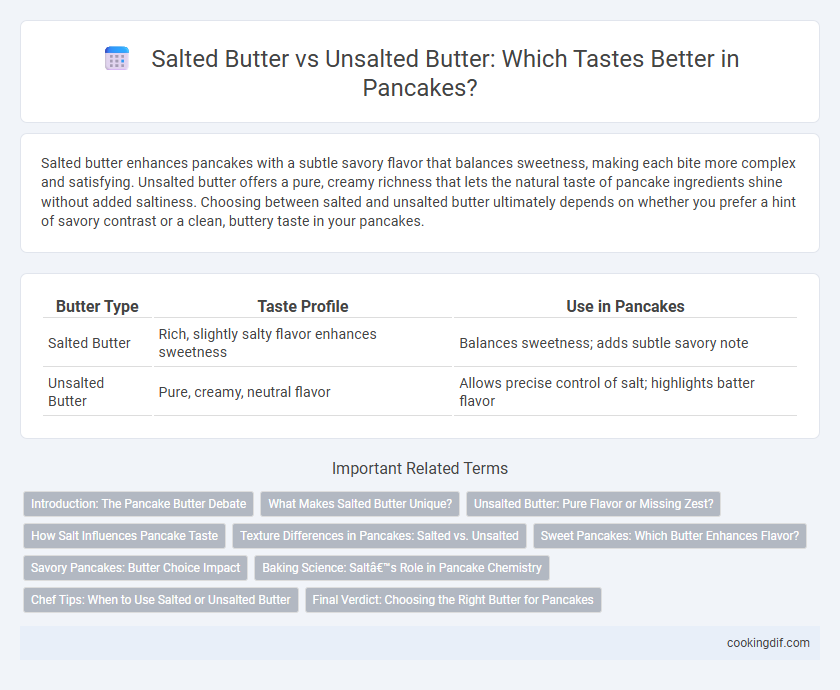Salted butter enhances pancakes with a subtle savory flavor that balances sweetness, making each bite more complex and satisfying. Unsalted butter offers a pure, creamy richness that lets the natural taste of pancake ingredients shine without added saltiness. Choosing between salted and unsalted butter ultimately depends on whether you prefer a hint of savory contrast or a clean, buttery taste in your pancakes.
Table of Comparison
| Butter Type | Taste Profile | Use in Pancakes |
|---|---|---|
| Salted Butter | Rich, slightly salty flavor enhances sweetness | Balances sweetness; adds subtle savory note |
| Unsalted Butter | Pure, creamy, neutral flavor | Allows precise control of salt; highlights batter flavor |
Introduction: The Pancake Butter Debate
Salted butter enhances pancake flavor by adding a subtle, savory contrast that balances the sweetness of syrup and batter, creating a richer taste experience. Unsalted butter offers a pure, creamy texture allowing precise control over salt levels in the recipe, making it ideal for those who prefer customization. Choosing between salted and unsalted butter depends on desired flavor intensity and dietary preferences, influencing the pancake's overall taste profile.
What Makes Salted Butter Unique?
Salted butter offers a distinct flavor profile due to the added salt, which enhances the taste and balances the sweetness in pancakes. Its salt content varies by brand but generally ranges from 1.5% to 2%, providing a subtle savory note that can elevate the overall flavor. Unlike unsalted butter, salted butter's salt acts as a natural preservative, slightly extending shelf life while delivering a richer, more complex taste.
Unsalted Butter: Pure Flavor or Missing Zest?
Unsalted butter offers a purer, creamier taste in pancakes, allowing bakers to control salt levels precisely and highlight the natural flavors of ingredients. Without added salt, the subtle sweetness and rich dairy notes become more pronounced, enhancing the overall taste profile. However, some may find unsalted butter pancakes lack the slight savory kick that salted butter provides, which can elevate the flavor complexity.
How Salt Influences Pancake Taste
Salted butter enhances pancakes by adding a subtle briny contrast that balances sweetness and intensifies flavor complexity. Salt improves the Maillard reaction during cooking, resulting in a richer golden crust and deeper taste. Unsalted butter allows precise salt control in the batter, but lacks the inherent savory notes that salted butter imparts to the finished pancake.
Texture Differences in Pancakes: Salted vs. Unsalted
Salted butter tends to create a slightly firmer texture in pancakes due to the salt drawing moisture out of the batter, resulting in a denser crumb. Unsalted butter allows for better control over salt content, yielding a lighter, fluffier pancake texture. The choice directly influences batter consistency and final pancake moisture, making salted butter suitable for those who prefer a more compact bite.
Sweet Pancakes: Which Butter Enhances Flavor?
Salted butter adds a subtle savory contrast that enhances the sweetness of pancakes by balancing sugary notes without overpowering them. Unsalted butter offers a pure, creamy flavor that allows the natural sweetness of the pancake batter and toppings like maple syrup or fruit to shine. For sweet pancakes, salted butter often provides a richer, more complex taste experience, while unsalted butter maintains a cleaner, more delicate profile.
Savory Pancakes: Butter Choice Impact
Salted butter enhances savory pancakes by adding a balanced, rich flavor that complements ingredients like herbs, cheese, and meats, intensifying the overall taste profile. Unsalted butter allows precise control over salt levels, offering a cleaner, more neutral base that highlights delicate or subtle savory fillings. Choosing salted butter boosts immediate flavor complexity, while unsalted butter provides versatility for tailored seasoning in savory pancake recipes.
Baking Science: Salt’s Role in Pancake Chemistry
Salted butter contains added salt that influences the pancake's flavor profile and chemical reactions during cooking, enhancing browning through the Maillard reaction. Unsalted butter allows precise control of sodium levels, preventing excessive saltiness while still contributing fat that aids in gluten structure and moisture retention. Salt modulates enzyme activity and protein interactions in batter, balancing taste and texture for optimal pancake fluffiness and color.
Chef Tips: When to Use Salted or Unsalted Butter
Salted butter enhances flavor with added salt, perfect for finishing pancakes or when precise salt measurement isn't critical. Unsalted butter offers better control over seasoning, ideal for batter preparation to ensure balanced taste. Chefs recommend using unsalted butter for cooking and salted butter for serving to achieve optimal flavor and texture in pancakes.
Final Verdict: Choosing the Right Butter for Pancakes
Salted butter adds a hint of savory richness that enhances the sweetness of pancakes, creating a balanced flavor profile ideal for those who prefer a slightly savory edge. Unsalted butter offers pure creaminess and allows precise control over salt levels, making it perfect for recipes where customization is key. The final verdict favors unsalted butter for versatility and taste control, but salted butter serves well when a quick, flavorful boost is desired.
Salted butter vs unsalted butter for taste Infographic

 cookingdif.com
cookingdif.com